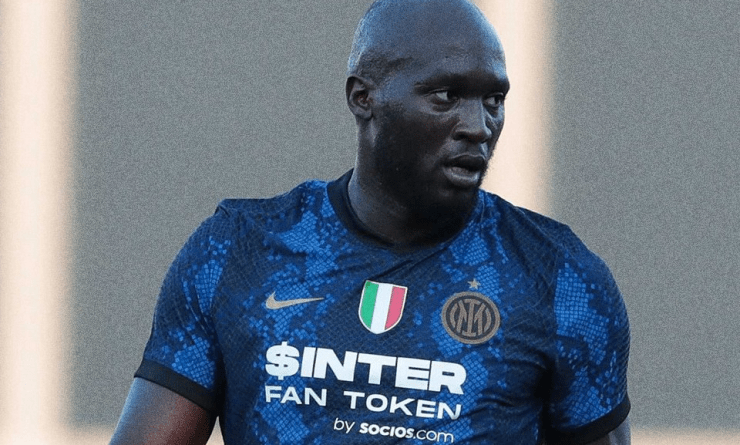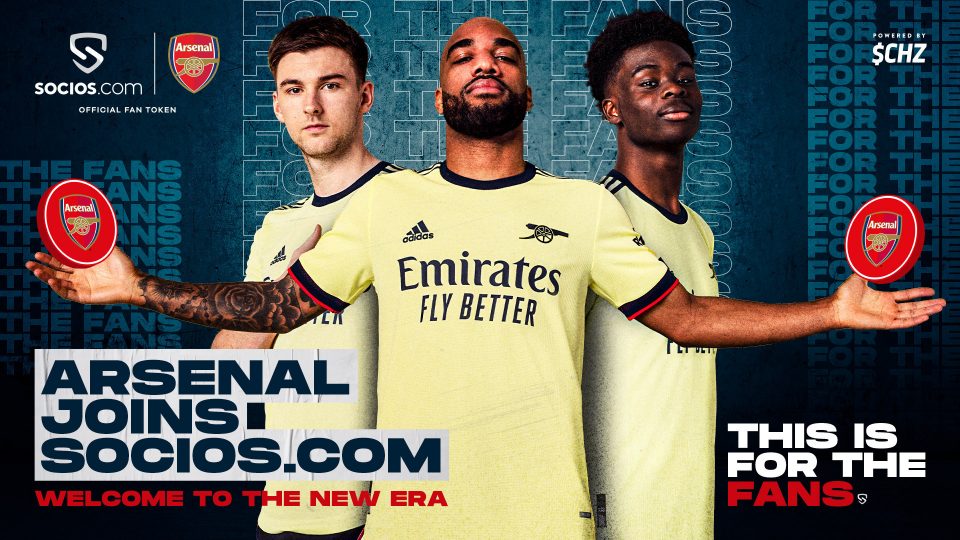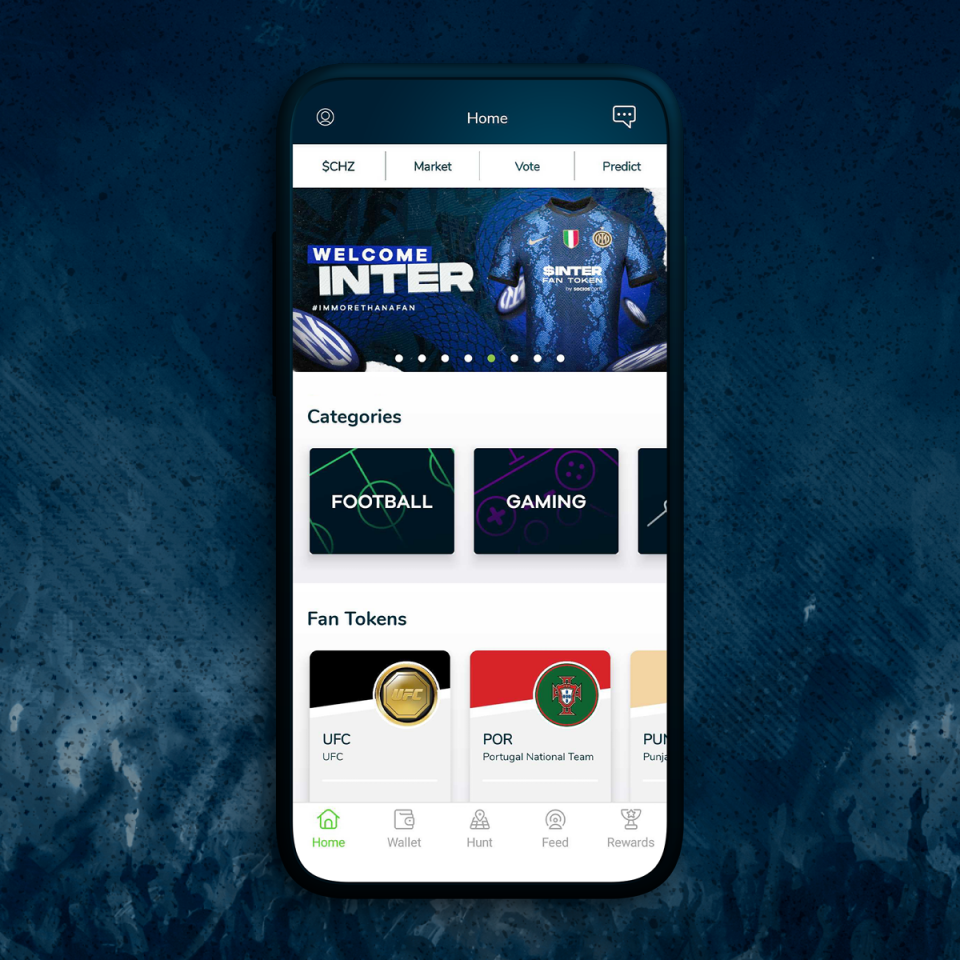Socios: The blockchain-enabled fan token platform promising to unlock revenue from the global fanbases of sport’s most famous teams
Football’s transfer market may have lacked headline-grabbing deals so far this summer but the same can’t be said for Socios.
The platform, which sells “fan tokens” offering supporters the chance to influence decisions at their team, has instantly increased visibility with a clutch of major partnerships.
Last week Socios announced the launch of an Arsenal token, adding another storied club to a roster that already includes Barcelona, Juventus, Manchester City and Paris Saint-Germain.
Days later, it signed a deal with Inter Milan that will see the Italian champions’ fan token advertised on their famous blue and black shirts next season.
And earlier in the month, the brand boosted its South American presence by sponsoring Argentina’s top football division, now renamed the Torneo Socios.
These partnerships have thrown the spotlight onto the blockchain-based platform, billed as a fan engagement tool not just for football but also other sports and entertainment.
But the deals have also revived debate about the platform, which has been criticised and, in one case, forced out of a club by angry supporter groups.
The company’s story highlights the tension between teams courting overseas followers and keeping their domestic faithful onside at a time of heightened awareness of fan power.
Socios: inception, growth and how it works for fans and teams
Socios borrows its name – and the kernel of its concept – from the Spanish word for members of supporter-run clubs such as Barcelona and Real Madrid.
By owning fan tokens, which cost £2, supporters can use the app to vote on decisions such as what to name a training ground or which song should be played at games after a goal.
The app has taken off quickly, with 1.2m downloads since it launched in 2019. The company says it has 900,000 active users.
For teams, the incentive is a 50-50 split of revenue when their tokens are sold or traded, meaning multi-million-pound payouts potentially for several years as more tokens are issued.
Socios already has 45 partners in football, cricket, motor racing, NBA basketball and mixed martial arts who have shared in $150m of revenue this year.
Its emergence is also an example of cryptocurrency’s incursion into sport, a trend already visible in the NFT boom and an increasing number of sponsorship deals.
The platform is owned by Chiliz, a company whose eponymous cryptocurrency is used for buying Socios fan tokens and is traded on major exchanges.
It is the brainchild of Frenchman Alexandre Dreyfus, an internet entrepreneur since the mid-1990s who previously ran an online poker league.
It was while trying to find ways to monetise followers of the teams in his poker league that he settled on the idea of selling voting rights on certain decisions.
He quickly realised it would be better applied to more popular and established sports, and Socios was born.
“We believe that the future of the sports industry is to go from the passive to the active fan,” Socios and Chiliz chief executive Dreyfus tells City A.M.
He points out that while it is possible to buy shares in publicly traded football teams such as Manchester United and Juventus, it is expensive and comes with no guarantee of influence over decisions.
So Dreyfus reasoned that Socios could “create a new level which is not a share in the company but a share of influence.”
‘Not acknowledging fans in Korea or Brazil is discrimination’
It may not be explicit in the marketing materials of Socios or its partners, but the platform is aimed at the sizeable global fanbases of top sports teams.
For that reason it has focused on those with worldwide reach such as Atletico Madrid and AC Milan, and the NBA’s Philadelphia 76ers, Boston Celtics and Cleveland Cavaliers.
Socios has also issued fan tokens for Formula 1 teams Aston Martin and Alfa Romeo, and Indian Premier League cricket franchises Royal Challengers Bangalore, Kolkata Knight Riders and Punjab Kings.
“My job is to monetise the 99 per cent of fans that aren’t in the stadium,” he says.
A Premier League club or NBA team might have 100m supporters worldwide, Dreyfus explains, but only know how to sell to the 50,000 who attend games. On top of that, he says, they lack the appetite for risk to launch a project like Socios by itself.
“We are not targeting the guy who has a tattoo and is a season ticket holder. Our clients are the guys who will most likely never go to the stadium and yet dream about the team but were born in Korea, Japan, Turkey or Brazil. Not acknowledging them is discrimination.”
Meanwhile, teams are on the hunt for any new revenue streams as broadcast rights values plateau or fall and ticketing and sponsorship income has a ceiling.
“Of course it is money driven,” Dreyfus says. “Sports teams need to pay their players; players are more and more expensive; therefore you need more and more revenue. We are a new revenue stream – period.”
Why some supporters’ groups have criticised Socios
Chasing engagement from overseas fans by partnering with Socios has not gone down well with some domestic supporters.
The Football Supporters’ Association (FSA), which helped the Department for Culture, Media and Sport draw up guidelines for clubs to engage with fans, has said: “Socios attempts to monetise fan engagement which the leagues and clubs have committed to doing for free. There should be no financial barrier to engaging with your football club.”
When West Ham United announced in 2019 it had become the first Premier League club to partner with Socios, a coalition of Hammers fan groups launched a “Don’t Pay To Have Your Say” campaign. The club and Socios decided not to go ahead with the West Ham fan token.
The Arsenal Supporters’ Trust, meanwhile, gave the announcement of its club’s plans to join the platform a cool response.
“It is a concern that the club is trying to monetarise fan opinion and engagement,” said the AST, who added it had not been consulted on the decision.
Just months ago, clubs including Arsenal vowed to engage more with fans after their vigorous opposition helped derail the European Super League project.
That episode has also shaped the recommendations of a UK fan-led review of football governance, currently being led by former sports minister Tracey Crouch.
When the Arsenal-Socios deal was announced, the FSA tweeted: “One day saying you’re committed to supporter engagement. The next day, trying to monetise it.”
‘Gimmicky? Sometimes. But not a gateway to Bitcoin trading’
Socios emphasises that is not just about influencing decisions at a team; it also offers unique prizes and experiences, and promises to connect a like-minded community.
Dreyfus says that Socios users will not supersede or silence other supporter voices since all season ticket-holders or members of partner teams are offered a free fan token.
But he also dismisses the company’s critics as a disproportionately vocal minority, or “50 guys who make a noise”.
“The messaging of ‘we have to pay to have a say’ is not true,” he adds. “One: the people already engaging in a traditional way get a token for free. Two: some people – just in the UK – are complaining because for the first time they have a say and it’s thanks to us.”
Dreyfus says charging Socios users for influence “makes sense”. “Me giving my say in something that matters – of course it has a price. It’s valuable.”
He also rejects the suggestion that Socios overstates the influence its users have over teams, when many of the matters put to vote appear inconsequential.
The platform is transparent about what is and isn’t on offer, he says, and has pledged to teams that it will not meddle in sporting or business decisions.
“These kind of small things, are they gimmicky? Yes, sometimes they are, but it’s still more than what you had the day before.”
On the question of whether Socios encourages trading, he says: “Maybe. Some will hold their token forever, some will trade because there is a gamified element to it, so why not?”
It won’t make them start buying Bitcoin, though, he argues. “Does it educate you about the fact there’s a trading component involved with stock? Yeah, sure, probably, and that’s fine.”
Socios ‘no worse than Facebook or TikTok’, ‘here to stay’ and targeting US sports
Socios has more signings in the pipeline and, unlike some of its clients, it won’t stop when the transfer window closes next month.
It is preparing announcements for partnerships that have already been inked with multiple Premier League clubs and Dreyfus expects to agree more in August.
It has big plans for US sports, where it has struck deals with more than 20 teams, including some in the NFL, that are also waiting to be unveiled.
The company was close to a music partnership before the pandemic shut down concerts, he adds, but also intends to move into entertainment.
“We’ve proven that we are here to stay,” Dreyfus says he tells potential clients. “This is not about you believing it [or not] because it is happening. The question is whether you embrace it now or later.”
Despite the popularity of NFTs, Chiliz is committed to focusing on its share of the blockchain-enabled sports market.
In a statement of intent, the company recently spent $6m on acquiring fantoken.com, its trademarks and Twitter account.
“We’re not here to take money from the fans,” says Dreyfus. “What we do is not bad; we are not bad actors. We aren’t worse than Facebook or TikTok. It’s just the monetisation is different.”




